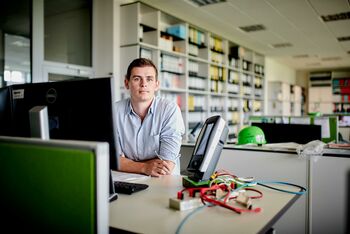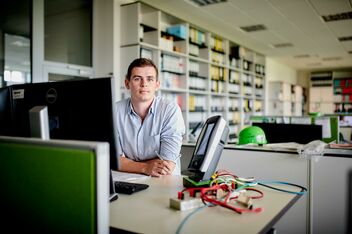Success story: Entry as electrical engineer
After graduating from his master’s course in Systems Engineering at Landshut University of Applied Sciences (HAW Landshut), Benjamin had no trouble launching his career at SENNEBOGEN. In the interview, he explains how he accomplished this, what he likes most about his current position, and provides tips for launching a successful carrier at SENNEBOGEN.
Benjamin, you did your master at the Landshut University of Applied Sciences. How did you find out about SENNEBOGEN?
Well, I’ve always been studying in the region. I got my Bachelor in Mechanical Engineering at the OTH Regensburg, and then my Master in Systems Engineering at HAW Landshut. I heard about SENNEBOGEN from friends who worked there. Then I found out what positions were posted on the homepage and ended up finding an interesting task for my master’s thesis that was right for me.
How did the subsequent transition to a permanent position go? Did that happen on the spur of the moment, or did it already crystallize while you were working on your final thesis?
I was already on my way towards a permanent position while I was working on my master’s thesis. I was at SENNEBOGEN for about two months when my current department manager (who was supervising my master’s thesis at that time) came and asked me if I could picture myself joining his team on a permanent basis. Once I had thought about it for a while and my field of tasks was explained, I was already presented with my employment contract.
What do you like most about your work at SENNEBOGEN?
One thing is the product, of course, which in my case is the telecranes, and I find them fascinating. Another is the great degree of freedom in the development of new machines and the possibility it entails of bringing my own ideas to the table. Integrating new functions in the machines also makes my work very exciting.
In light of your career so far, would you do the same thing again the same way?
I basically would. Except that, knowing what I know now, I might take a dual curriculum or an apprenticeship beforehand. This makes it easier – especially in a technical curriculum – to handle one task or another when you already have a head start and have seen a lot in practice.
What tip do you have for students who aren’t sure what career to get into?
During your studies, you should definitely ask yourself what lectures you find particularly interesting and then work with that field of subjects in an active and intensive manner. Then you’ll quickly find out whether the direction you’re taking will still be interesting to you on the long term. In combination with practical experience through internships or as a working student, this will make you a perfect candidate for a position in the field in question.


